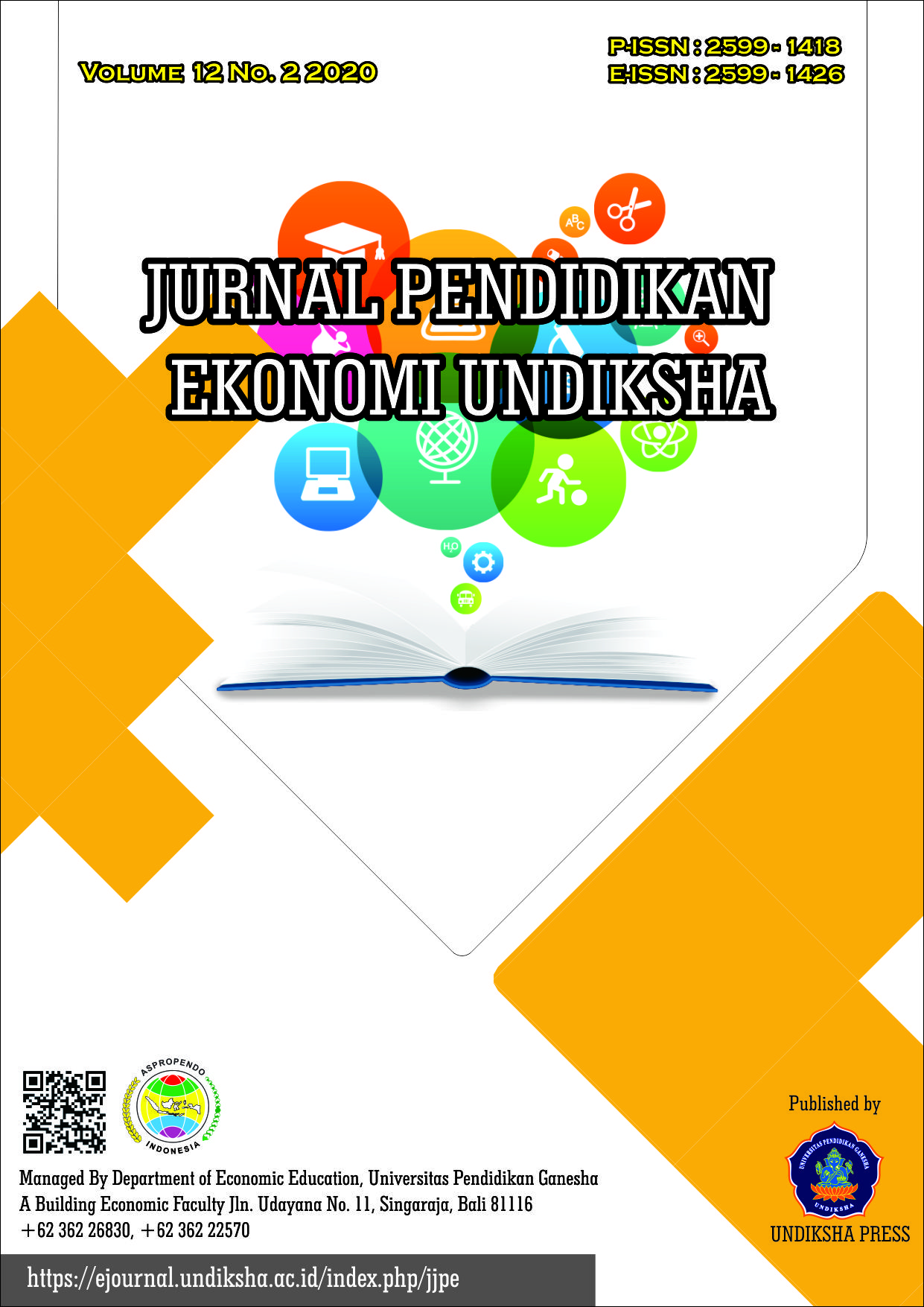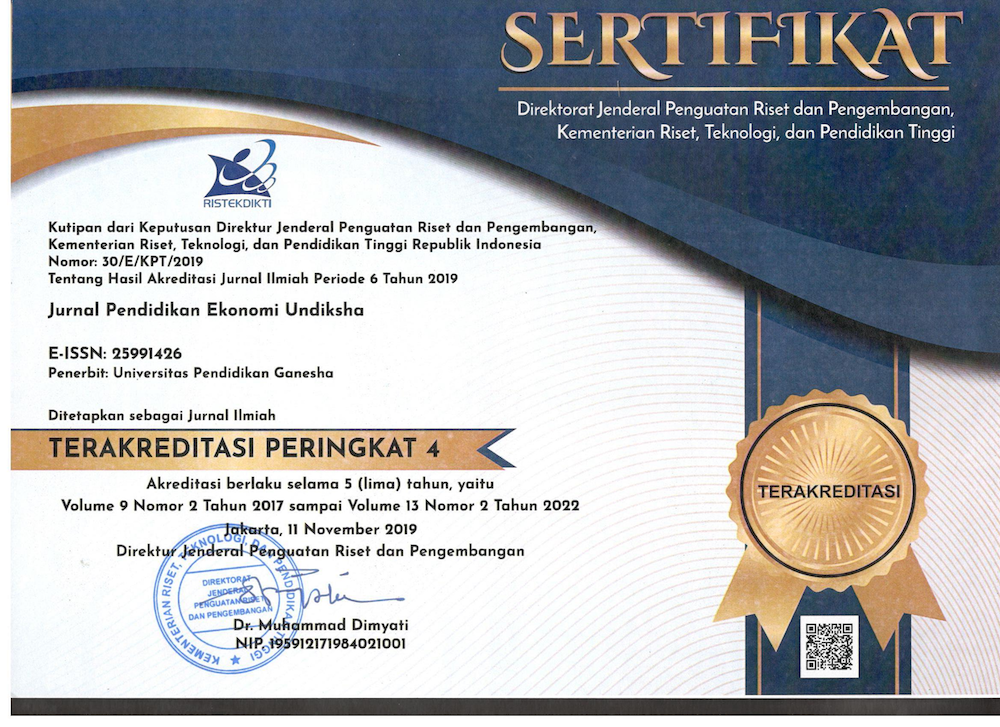Implementasi Social Entrepreneurship pada Koperasi Wanita Srikandi
DOI:
https://doi.org/10.23887/jjpe.v12i2.29772Keywords:
Social Entrepreneurship, CooperativeAbstract
The study aims to known what motivation which underlie the business founder to choose social entrepreneurship in establishing Koperasi Wanita (Kopwan) Srikandi, how the implementation of social entrepreneurship implemented on the activities of Kopwan Srikandi, and the impact appeared of the implementation social entrepreneurship in Kopwan Srikandi. The study was used qualitative approach with case study design. The techniques of collecting data used in this study are observations, interviews, and document studies. Data analysis techniques used in this study was by collecting data, data reduction, presentation and conclusion. The result of this research show that in the establishment of Kopwan Srikandi, it underlie by the consciousness of the founder in seeing and identifying the social problems in society, then implemented in a business entity that is a cooperative with a social mission which is expected to solve the problems. Kopwan Srikandi have two business units, there are saving and loan unit and production unit in which both of them implement the social entrepreneurship. It can be seen from the existence of cooperative entrepreneurs and type of activities that contain a social values. The impacts of social entrepreneurship appeared in Kopwan Srikandi are the improvement of human resources, the development of local natural resources and the improvement of the economic activities of the community.
References
Dees, J. G. (2001). 【Reformatted and revised】 The Meaning of “Social Entrepreneurship.” 1–5. https://centers.fuqua.duke.edu/case/wp-content/uploads/sites/7/2015/03/Article_Dees_MeaningofSocialEntrepreneurship_2001.pdf
Ebrashi, R. El. (2013). Social entrepreneurship theory and sustainable social impact. Social Responsibility Journal, 9(2), 188–209. https://doi.org/10.1108/SRJ-07-2011-0013
Germak, A. J., & Robinson, J. A. (2014). Exploring the Motivation of Nascent Social Entrepreneurs. Journal of Social Entrepreneurship, 5(1), 5–21. https://doi.org/10.1080/19420676.2013.820781
Guclu, A., Dees, J. G., & Anderson, B. B. (2002). The Process of Social Entrepreneurship : Creating Opportunities Worthy of Serious Pursuit. Innovation, November, 1–15.
Gusti, R., Palenti, citra dwi, & Kusumawardani, E. (2017). Enterpreneur Pada Mahasiswa Pendidikan Luar Sekolah. Seminar Nasional Pendidikan Nonformal FKIP Universitas Bengkulu, 1(July 2017), 130–146.
Haryanti, D. M., Rahayu, S., Hati, H., Wirastuti, A., & Susanto, K. (2016). Berani Jadi Wirausaha Sosial ? DBS Foundation. http://dbs.com/iwov-resources/pdf/indonesia/social-good/Berani-jadi-SE-24Jun2015-final.pdf
Hibbert, S. A., Hogg, G., & Quinn, T. (2005). Social entrepreneurship: understanding consumer motives for buying The Big Issue. Journal of Consumer Behaviour, 4(3), 159–172. https://doi.org/10.1002/cb.6
Hossain, S., Saleh, M. A., & Drennan, J. (2017). A critical appraisal of the social entrepreneurship paradigm in an international setting: a proposed conceptual framework. International Entrepreneurship and Management Journal, 13(2), 347–368. https://doi.org/10.1007/s11365-016-0400-0
Lexy, J. M. (2019). Metodologi Penelitian Kualitatif (Edisi Revisi). PT Remaja Rosdakarya.
Mair, J., & Martí, I. (2006). Social entrepreneurship research: A source of explanation, prediction, and delight. Journal of World Business, 41(1), 36–44. https://doi.org/10.1016/j.jwb.2005.09.002
Undang-Undang Republik Indonesia Nomor 25 Tahun 1992, Tentang Perkoperasian 1 (1992).
Pandji, A., & Djoko, S. (2002). Koperasi, Kewirausahaan, dan Usaha Kecil. Rineka Cipta.
Pratiwi, Z. S. (2011). Perancangan Kampanye Peningkatan Kesadaran Berwirausaha Sosial “ Generasi Pengubah .” Jurnal Tingkat Sarjana Bidang Senirupa Dan Desain, 1(2), 2.
Rediyono. (2012). Jangan Mendirikan Koperasi. Family Press.
Revrisond, B. (2017). Koperasi Indonesia. BPFE.
Seelos, C., & Mair, J. (2005). Social entrepreneurship: Creating new business models to serve the poor. Business Horizons, 48(3), 241–246. https://doi.org/10.1016/j.bushor.2004.11.006
Setiaji, K., & Farliana, N. (2019). Praktik perkoperasian (Pendirian, Manajemen, Pertanggungjawaban dan Rapat Anggota) (Issue Desember). LPPM Universitas Negeri Semarang.
Stryjan, Y. (2006). The practice of social entrepreneurship: Theory and the Swedish experience. Journal of Rural Cooperation, 34(2), 197–229.
Sugiyono. (2015). Quantitative, Qualitative and R & D Research Methods. Alfabeta.





